Anno 117: Pax Romana has me thinking about all the little guys
One of the things I enjoy most about this genre is the point where I have a bustling little town, and I can just take a moment to sit back and watch all the people go about their day. It’s a little reward for all your hard work setting up supply chains and making sure their needs are met.
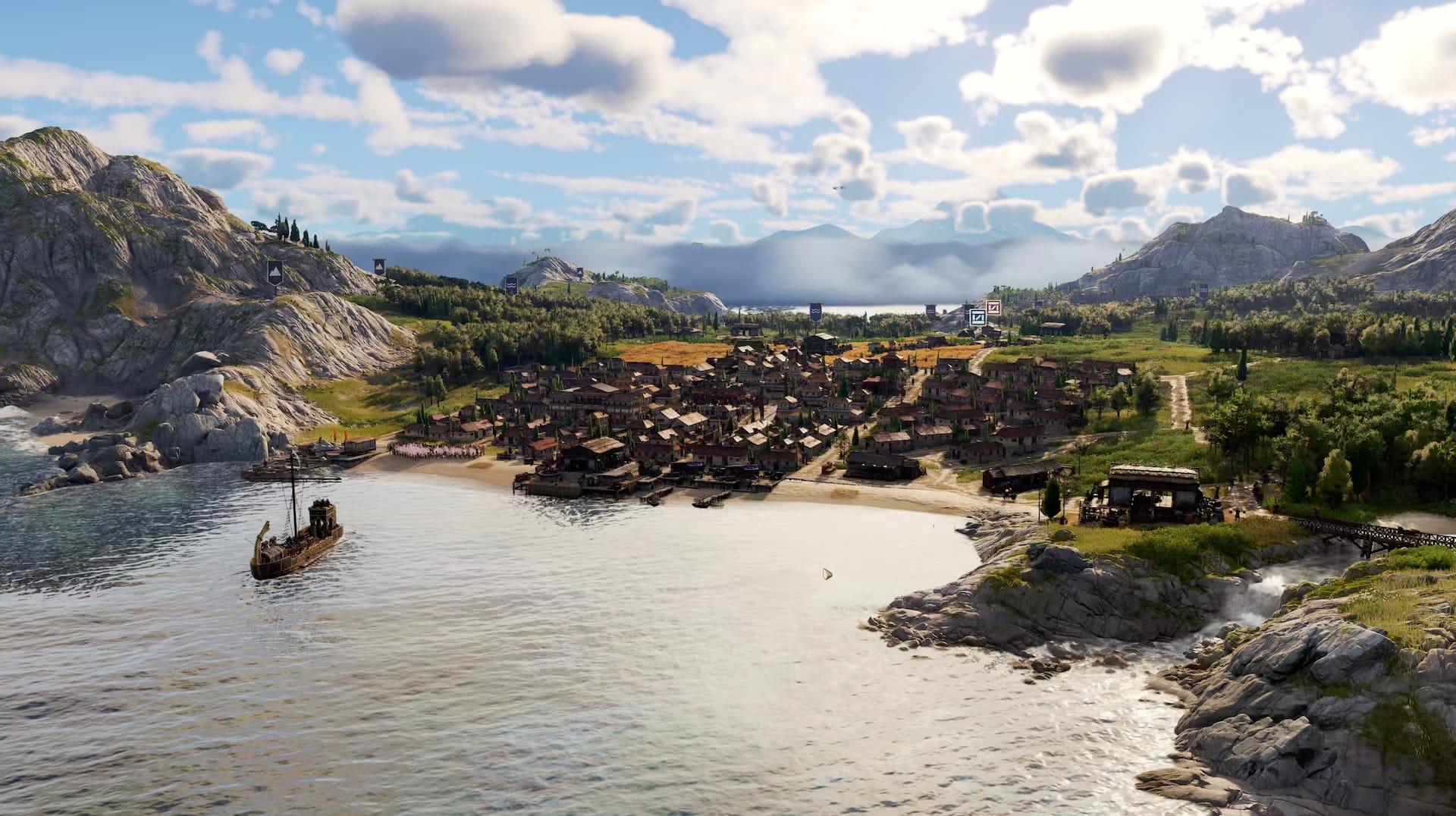
How often do you think about the Roman Empire? This question, specifically when it was asked of a man, became a meme in late summer of 2023. My wife was a little surprised when I answered “maybe once a week, or a couple times a month?”
“… really?”
“Well, ancient Rome, and lots of other ancient cultures. I think it’s… neat how differently people lived back then but also how similar things could be.” I was thinking about the graffiti unearthed at Pompeii or ancient garbage dumps, where the common people’s history was captured, the people who couldn’t afford clay tablets or paper scrolls. The crude jokes, the gossip, the drunken escapades. Their world was no doubt much harder than mine, but they found solace in many of the same things we do today.
Anno 117: Pax Romana is a game for thinking about those people. Building their homes, supplying their needs, and upgrading their station in life. Oh, there’s tons of other things to think about too: land and naval combat, the Roman Pantheon, and Imperial politics just to name a few. But what feels most improved since the excellent Anno 1800, is how good Pax Romana feels as a city builder.
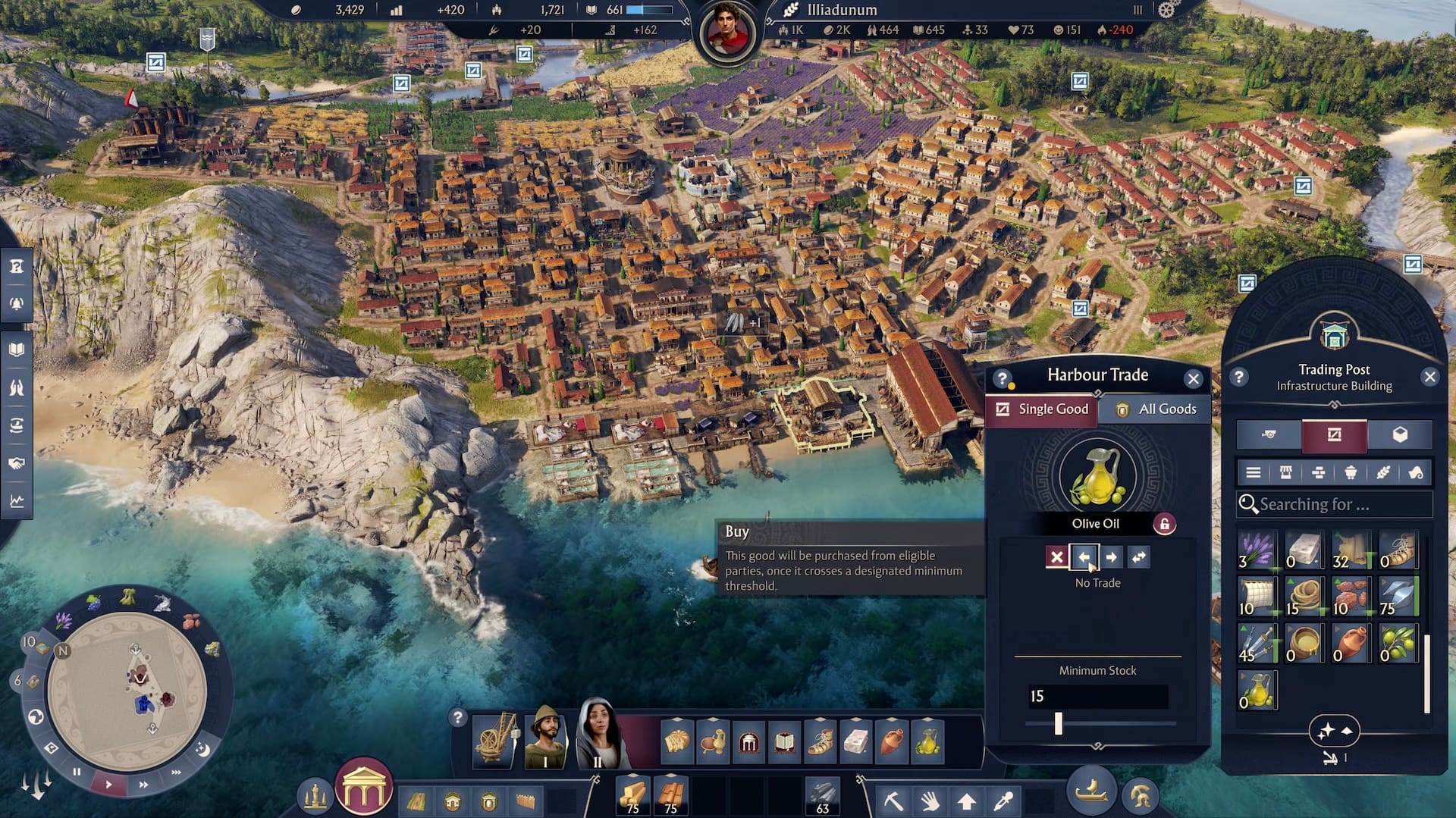
That’s not a dig at 1800, because that game, and the series as a whole, is also a sprawling trade and logistics simulator. In order to feed and clothe your citizens, you need farms and factories. Satisfied citizens could upgrade their homes and class, allowing them to do more complicated jobs but also bringing along new demands. This forced your supply chain to stretch wider, onto other islands or continents, in search of exclusive resources. These logistics might be present in a city builder like Timberborne or Against the Storm, but the Anno series’ complexity is more akin to a Factorio or Satisfactory.
This scale is what sets the franchise apart. Anno 1800 lets you zoom all the way in to see your citizen’s enjoying a walk in the zoo and then zoom all the way out to see individual islands, and zoom out further to a map showing the many continents your domain touches. You could manage supply chains between your islands with a massive naval fleet, or incorporate economic diplomacy or even war into your logistical engine. The grandiosity of this merger of city builder and logistics simulator still feels unique in the genre, but in the interval since Anno 1800 was released in 2019, indie city builders have flourished across digital storefronts.
I’ve already named a few, but you can find tons of innovative, gorgeous, creative city builders worth your while, games that tell stories or inject new ideas into the space. So I felt on this front in particular, Pax Romana had to deliver. And I’m happy to report it’s made great strides here.
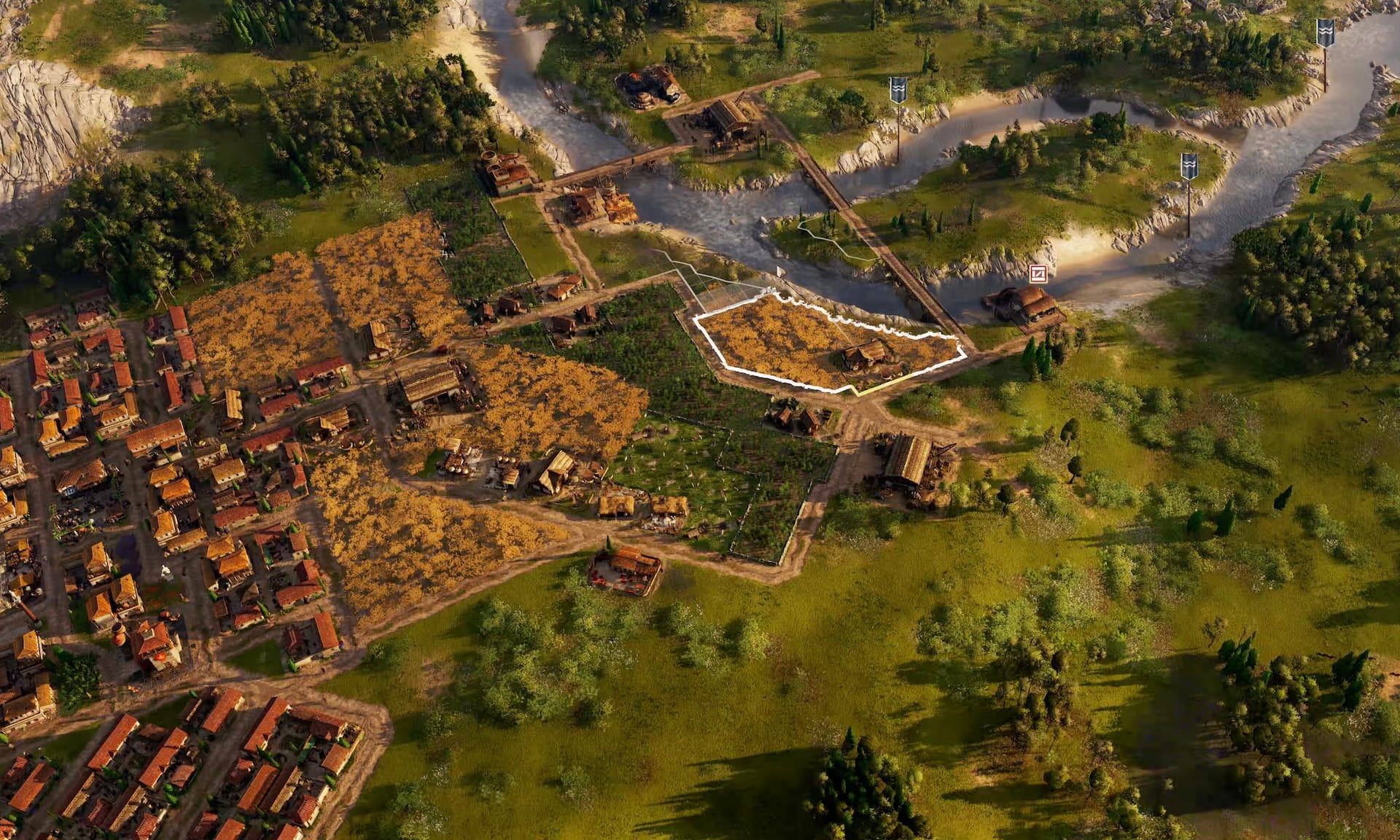
Perhaps the most immediately noticeable upgrade is diagonal roads. Yes, that might sound like a small change, but its implementation instantly gives you more control over your cities design and makes them feel more organic. In a world where city builders often go fully free form, it can feel a tad restrictive, but it’s a compromise to keep the grid that’s so innate to Anno’s city building. Plus, the addition of diagonal roads has other bonuses: you can paint your farm fields into the nooks and crannies they create and squeeze decorations into even more places!
The UI, which was serviceable if a tad overwhelming in 1800 is also clearer: you can easily see the effect a building will have in your city, good or bad, including its range and synergies. In terms of adapting with the times, I’m happy I could easily use WASD camera controls to glide around my islands. This control setup, which apes the shooter controls everything from Fortnite to Valorant uses, feels like the default in the recent crop of city builders, no doubt a part of the reason they’ve found wider appeal.
Farming and clothing are still desired by your citizens but these Romans (or Cetlic inspired people, just not in the preview I played) have needs new to the Anno series. Faith is a requirement but also a boon. Building a Sanctuary lets you devote your island to a particular god, giving you an RPG-like upgrade path. For example, choosing Ares gives your soldiers and iron mining a boost while worshipping Ceres makes your farms extra fertile. Prestige is required for politicking with your neighbors and your emperor (more on that in a bit). Your plebeians also want to be educated, and their shiny new “Grammaticus” supplies you with knowledge.
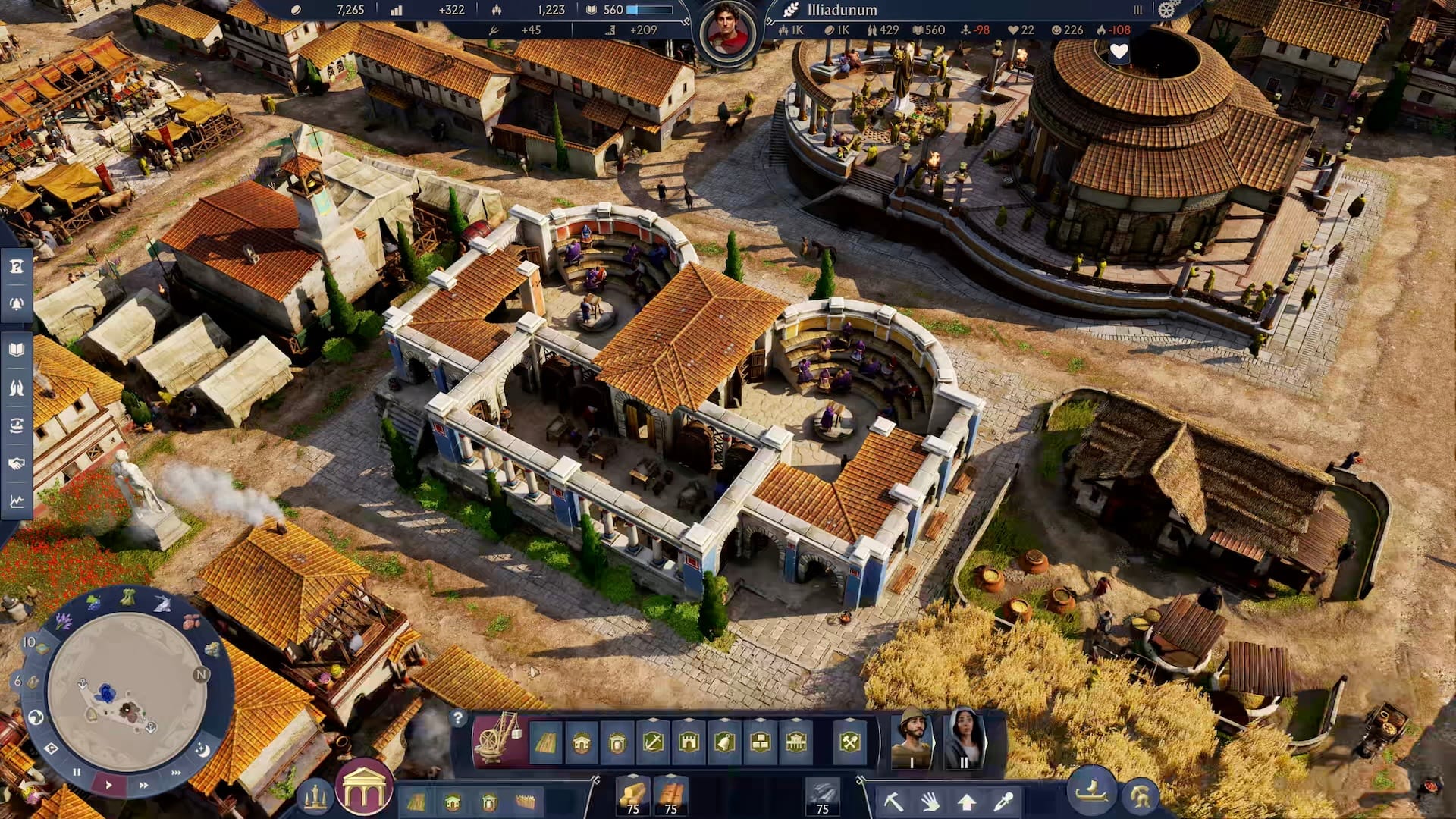
This knowledge gets spent in a tech tree, divided into three columns: Economic, Civic, and Military. Individual upgrades might unlock a new building, increase your ships speed or improve a factory’s production rate. Since some research options are actually an “A or B” choice, or are locked until you complete specific tasks, the experience can also feel like an upgrade path in an RPG. By borrowing from role playing games, Pax Romana communicates with the player in a more familiar way, and gives players more control over how their cities are designed.
Near the end of my play session I began tinkering with the game’s aqueduct, which delivers the fresh water necessary to satisfy a whole new class of citizens. This water is sourced from a “mountain resource”, a universal harvest point that you can also use for a coal mine, or an iron mine, etc., depending on what resources the island has. This is much more flexible than in the past games where each node supplied a single, specific resource, restricting the design possibilities.
But to get back to the people.
One of the things I enjoy most about this genre is the point where I have a bustling little town and I can just take a moment to sit back and watch all the people go about their day. It’s a little reward for all your hard work setting up supply chains and making sure their needs are met. It’s an absolute treat in Pax Romana, where the cities are lively and populous. They don’t model each citizen down to an individual economic unit like Cities: Skylines, but as your cities change so will the people walking its street. You’ll see philosophers walking the street if you have a Grammaticus and your priests will change depending on which god your island prays to.
The sights and sounds (and the sunsets, thanks to Pax Romana’s day/night cycle) makes the experience of just letting time go incredibly soothing. Creative director Manuel Reiner referred to the "The Aquarium Effect" when I asked about why this is such an indelible part of Anno and city builders at large, and I think that's very apt. City builders (can be) a lot of work! So I appreciate that the game has a built in reward outside of stat boosts and new unlocks.
In the previous game, citizens from every class of your empire make requests. A farmer might ask you to find their livestock wandering the streets or their drunken husband at the pub while an engineer might ask you for extra resources for a project. These charming little requests added character to the little guys walking about your streets. But now with prestige as a resource, these decisions carry additional weight.
While my preview only made it through the very early stages of the main campaign's story, I'm intrigued by its set up. As a governor in the fantastical Mediterranean region of Latium, you must balance the needs of your citizens with that of the Emperor's and the Empires. A citizen who's stuck in an arranged marriage can be assisted, boosting your people's happiness but damaging the prestige you need to navigate Imperial politics. Your governance can be one of honor or corruption, and I'm especially curious about the hints that you might be able to do the very Roman thing and rise up in rebellion against your emperor. You'll also be able to make use of ground troops for whatever military escapades you decide to engage in, though my preview was extremely limited in this area (I built a few legions and realized like many a Roman consul does that dang, soldiers are expensive!)
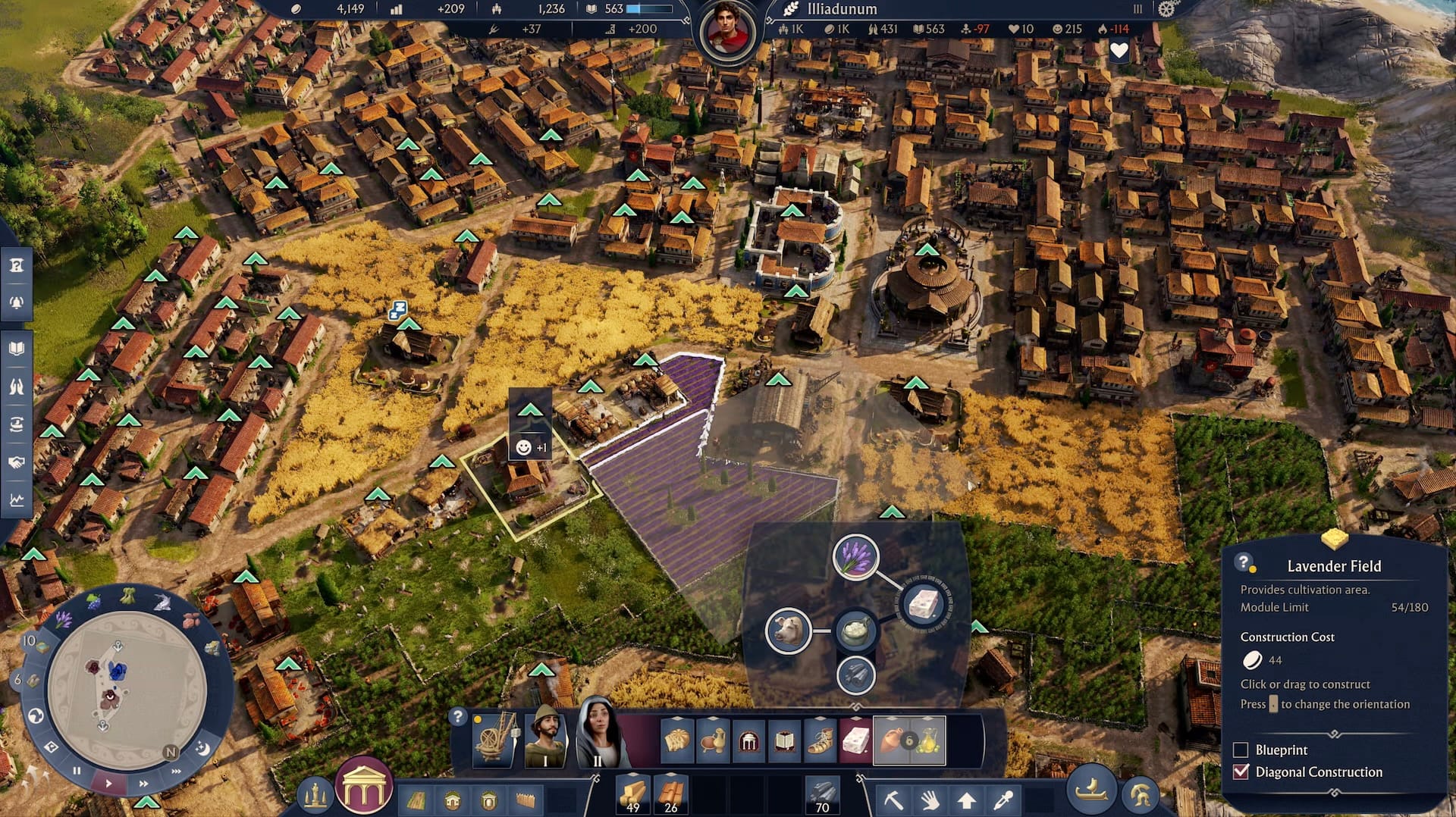
These tantalizing wrinkles to the Anno formula make excited for Pax Romana's historical-fantasy campaig. But when I went home and turned on Anno 1800, it was the quality of life improvements I missed the most. Diagonal roads and UI refinements made the act of building my city even more fun: I can't wait to get back to all my little guys.
(If you enjoyed reading this post and want to support me, for now please give to the former Polygon Workers GoFundMe!)
